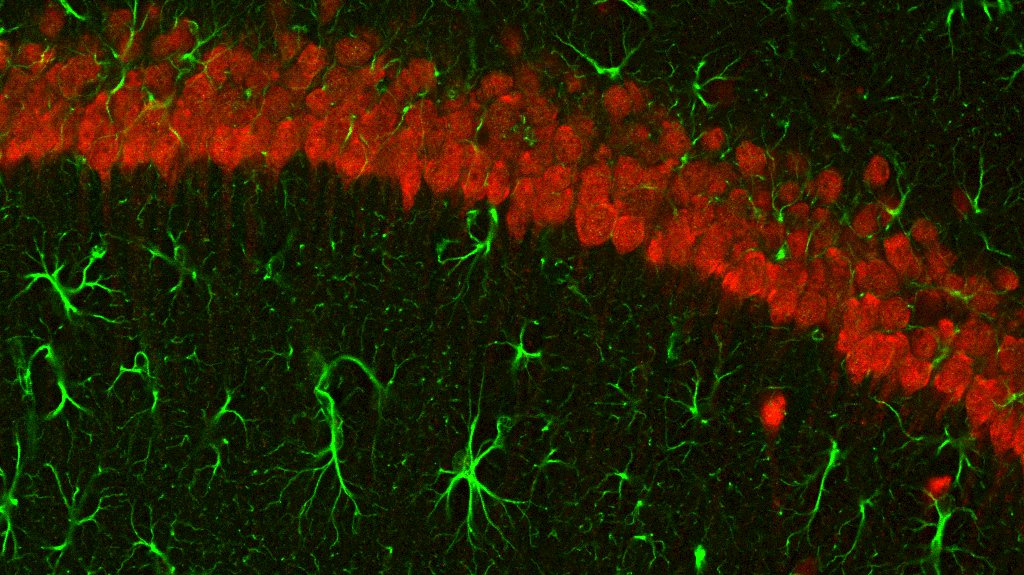
Four faculty members in the Department of Neuroscience at Washington University School of Medicine in St. Louis have been awarded their first R01 grants through the National Institutes of Health. This funding will support research critical to understanding the cellular and molecular processes occurring during neurodevelopment and in contexts such as dementia and other cognitive disorders.
Guoyan Zhao

R01: Dissect the mechanisms of selective regional vulnerability in Lewy body dementias via comparative snRNA-seq analysis
Guoyan Zhao, assistant professor in the department, was awarded her first R01 grant from the National Institute of Neurological Disorders and Stroke (NINDS) to study Lewy body diseases (LBDs). LBDs, including Parkinson’s disease (PD), Parkinson’s disease dementia (PDD) and dementia with Lewy bodies (DLB), share a common spectrum of disease pathology with distinctive Lewy body deposition patterns that correlate with neuronal losses and clinical manifestations unique to each disease. Zhao’s proposal will dissect the molecular mechanisms of selective neuronal and regional vulnerability in LBDs via novel genomics technologies and bioinformatics tools.
“I was thrilled that our proposal received an Impact Score of 29 and got funded at the first submission!” says Zhao. This five-year award of a total value of $3.5 million will provide molecular biomarkers and tools for neuron cell-type–specific protection and targeted astrocyte/microglia subpopulation isolation and manipulation as well as molecular biomarkers for distinguishing PD, PDD and DLB.
Zhao also received a two-year R03 award (total cost of $300,000) earlier this year to define molecular events driving selective neuronal death in multiple neurodegenerative diseases by snRNA-seq.
Thomas Papouin

R01: Role of astrocyte-based cholinergic neuromodulation in cognition and in the treatment of cognitive disorders
Thomas Papouin, who joined the department as an assistant professor in 2018, was awarded his first R01 grant from the National Institute of Mental Health (NIMH) to elucidate the molecular mechanisms of astrocyte-based neuromodulation and the causal role of this form of signaling in cognitive functions and in the behavioral effects of cognitive enhancers.
“I was shocked when I found out that the proposal scored 6th percentile on first submission! ‘This must be a mistake,’ I thought,” recalls Papouin, whose lab aims to establish new benchmarks for considering astrocyte biology in the treatment of cognitive disabilities and mental disorders. “This means our peers are excited about what we do, and I can’t think of a better validation for our lab.”
The goal of this five-year award, of a total value of $2.0 million, is three-fold:
- identify new operating principles that govern input-output fidelity in astrocytes
- define a tractable relationship between astrocyte signaling and cognitive behavior
- understand the role of astrocytes in the pro-cognitive effect of clinically tested schizophrenia therapeutics
Papouin was also awarded a $460,000 award by the Department of Defense earlier this year, as part of a two-year, $2.5 million Multidisciplinary University Research Initiatives project led by ShiNung Ching, an associate professor in the Electrical & Systems Engineering Department, involving six investigators across three departments and two universities. The project will study and implement multiscale neuroglia dynamics for robust non-Markovian learning and decision making.
Yao Chen

R01: Spatial, temporal and context-dependent features of GPCR-mediated protein kinase A activity
Yao Chen, an assistant professor who was recruited to the department in 2018, was awarded her first R01 grant from the National Institute of Neurological Disorders and Stroke (NINDS) to study the spatial, temporal and context-dependent features of neuromodulator-based intracellular signaling. Neuromodulator systems, which have transformative effects on animal behavior, are the target of most drugs for psychiatric disorders, neurodegenerative diseases and almost all drugs of abuse. However, very little is known about how neuromodulators function in normal physiology and in diseases.
“During neuromodulator signaling, as in a ballet performance, location, timing and interactions among the players are everything,” explains Chen. “And in order to watch the molecular ballet unfold, we have developed novel biosensors and built advanced optical systems.” This five-year award, totaling $2.0 million, will leverage these technological advances to uncover where and when neuromodulators induce signals inside cells, and how these spatial and temporal features alter cellular physiology. This could uncover new cellular mechanisms underlying neuromodulator function and help design better therapies for psychiatric and neurological disorders.
Jason Yi

R01: Understanding the mechanisms of UBE3A regulation in neuronal development
Jason Yi, an assistant professor in the department since 2017, was awarded his first R01 grant from the National Institute of Mental Health (NIMH) to study the mechanisms of UBE3A regulation in neuronal development. UBE3A is a gene that is linked to numerous diseases, including two devastating neurodevelopmental disorders: Angelman syndrome and Dup15q syndrome.
“Scientifically, the really interesting thing about these disorders is that a loss of UBE3A activity causes Angelman syndrome, whereas excessive UBE3A activity appears to play a critical role in Dup15q syndrome.”
This five-year award, totaling $2.0 million, will leverage gene variants in UBE3A to:
- identify mechanisms by which UBE3A activity is controlled in cells
- utilize model systems to assess the impact of specific UBE3A hyperactivity on neuronal biology and organism behavior
- test whether therapeutic intervention is possible to control excessive UBE3A activity